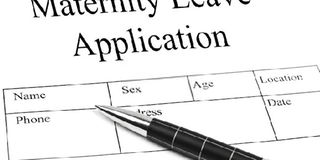100 teachers apply for maternity leave in Rakai

What you need to know:
- Available statistics indicate that women constitute 67 percent of the 1.2m workers who subscribe to trade unions in the country where they get opportunity of having their work-related issues addressed by employers using their union leaders.
Education authorities in Rakai District are puzzled after receiving information that at least 100 female teachers in various primary schools are pregnant and cannot teach.
The school term officially opened last Monday after two years of school lockdown occasioned by Covid-19 pandemic.
Available information indicates that of the 100 pregnant teachers, a total of 70 had by Friday applied for maternity leave.
A big number of them are teaching in schools in the sub-counties of Ddwaniro, Kyarurangira, Lwamaggwa, and Kiziba.
Mr Stephen Ssemutono, the Rakai District education officer, said all applicants have been cleared. He, however, declined to name the affected schools.
“Since it [maternity leave] is well stipulated in our laws, we have no powers to block someone from getting maternity leave,” he said on Saturday.
He revealed that in some affected schools, at least two to three female teachers have applied for leave.
Mr Ssemutono also said he had received information from some head teachers that more expectant teachers are yet to apply for maternity leave in the coming weeks.
“It is quite obvious that there is going to be gaps in staffing in the affected schools this first term because the maternity leave lasts for three months, the same period the school term takes,” he said.
Rakai District employs 1,300 teachers in 122 public primary schools where 800 of them are females.
“It’s good that all these schools have administrators. We have trust that they will liaise with the remaining teachers and see how lessons can be conducted,” Mr Ssemutono said.
In Lwengo District, the Resident District Commissioner, Ms Mariam Nalubega, criticised some female civil servants for giving birth almost every year instead of adopting family planning methods.
Ms Nalubega said such female civil servants are not only cheating government which pays them salary, but also their male workmates with whom they share job responsibilities. She said women spend three months on maternity leave and when they report back for duty after their leave, they spend most of their time thinking about their babies, which makes them unproductive.
“I am not saying we shouldn’t produce children, but let there be spacing rather than producing every year. It is also true that during pregnancy, a woman becomes sickly, which affects her performance,” Ms Nalubega said.
THE LAW
According to the Employment Act 2006, an expectant female worker is entitled to 60 days of maternity leave while a male employee, whose wife is expecting, is entitled to five days of paternity leave. However, some employers, especially those in private sector, infringe on the rights of expectant workers, and the few who comply partially offer such rights.
Available statistics indicate that women constitute 67 percent of the 1.2m workers who subscribe to trade unions in the country where they get opportunity of having their work-related issues addressed by employers using their union leaders.




